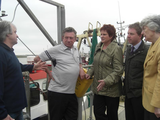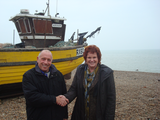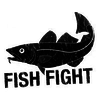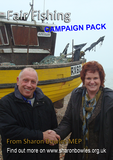Fishing in the South East 
The South East has the second-longest coastline in England, at 569 miles. The South East is also fortunate to possess three certified sustainable fisheries. In communities such as Ramsgate and Hastings, fishing has been a livelihood of many for generations.
As the economic situation for the UK's fishermen grows worse, numbers of fishermen are continuing to decline, and traditional communities based around the sea are suffering as a result.
World-wide we face a crisis in fishing, as overfishing threatens fish stocks and puts the long-term health of the oceans at risk. Governments around the world have taken various approaches to try and conserve fish stocks, and for the last forty years the EU and its predecessors have operated the Common Fisheries Policy.
Download Sharon's Fair Fishing campaign pack now
Reforming the Common Fisheries Policy
The Common Fisheries Policy is ripe for reform and efforts are underway in Parliament and the Commission to bring in changes by 2012.
The CFP has four functions:the conservation of stocks, vessels and installations, market controls, and external agreements with other nations.
However the CFP has been widely criticised for failing both the fishing industry and the marine environment. It has also been cited by Iceland and Norway as a considerable barrier to EU membership.
The Policy was last reviewed in 2002 and the decadal review due in 2012 offers the best chance in a long time for sensible reforms. The failures of the Policy are widely acknowledged, even by the European Commission and the member state governments. A level of reform is inevitable - what remains to be seen is how radical and positive CFP reform will be.
Total Allowable Catches - the discards policy
Visit the Fish Fight campaign website
Total Allowable Catches (or TACs) limit the maximum amount of fish that can be caught from a specific stock over a given period of time.
The setting of TACs at the European level is done at Council each December, following consultation from the International Council for Exploration of the Sea and the European Commission's Scientific, Technical and Economic Committee for Fisheries. The quotas are then allocated to Member States; the responsibility for the distribution of TACs within member states lies with the countries' governments.
TACs are distributed according the total available fish and a 'traditional share' of an area's catch: however the UK's records at the introduction of TACs in 1983 were inferior to French records, meaning that French fishers ended up with over 80% of the catch from the English Channel area.
If a fishing fleet exceeds their TACs then the notorious "discards" policy kicks in. Essentially, the discards policy was created to stop fishermen exceeding their TACs. It says that any fish over the allowed quantity must be thrown back into the sea. This leads to large quantities of dead fish being thrown back into the sea. It is estimated that around half of all fish caught in the north sea, for example, are thrown back dead into the sea due to this wasteful policy.
TV Chef Hugh Fearnley-Whittingstall has recently championed the successful "Fish Fight" campaign to end the discards policy. This campaign prompted EU Commissioner Maria Damanaki to make a statement in Spring 2011 saying that she would bring an end to this policy of discarding. She is expected to announce what amendments will be made later in 2011 or in 2012 when the whole Fisheries Policy will be up for review.
Armchair Fishermen
As you will already know, the EU Council of Ministers agrees the quota each country may catch of each type of fish, as agreed in the Common Fisheries Policy.
The national Governments then allocate proportions of that national quota to different fishing fleets.
There are some fleets who use large boats and are normally owned and operated by larger companies.
Other fleets use smaller boats (less than 10 metres long) and are normally operated by smaller businesses. The South East is particularly rich in these smaller fisheries, with substantial fleets on the Sussex and Kent coasts.
"Armchair fishermen" are a by-product of these large producer organisations who are given, by Westminster, the vast majority of all quota allocated to the UK.
For the past three years, these armchair fishermen (land-based businessmen) have been able to lease their surplus quota to smaller inshore fishermen, making a hefty profit in the process.
The larger companies can sell off some of their quota because they have more than they need. The smaller fleets need to buy the extra quota allowance because without it they will struggle to make a living.
The smaller companies are having to pay for this extra quota allowance that they really should have been given in the first place! 
For example, the current system allows sub-10 metre class boats to catch just 1.5 kg of cod per day. When you consider that just one cod can weigh 3kg that is a catch of half a cod per day - not enough to cover the cost of fuel let alone pay the crew.
Sharon is therefore calling on the UK government to address the totally unfair problem of the UK's fishing quota allocation and in particular the callous profiteering of armchair fishermen.
She has already written to Richard Benyon, The UK's Fisheries Minister, expressing her concern at the state of in-shore fishing in the South East of England.
Because of the financial burdens placed on inshore fishermen in the South East, the price of fish caught by small boats is way above that of fish landed by large producer organisations (who receive most of the quota).
Due to these higher costs, many fishmongers and restaurants will not buy locally caught fish from small fishing vessels. They prefer to get the same fish for a cheaper price from the larger fishing organisations.
In the same way, many of us in shops and supermarkets will buy fish that seems a good price, but may not realise that in doing so we are working against local small fishing fleets.
If we all come together we can use our collective voice to bring about much needed reform, not only to the EU-wide CFP but also closer to home!
Help Sharon end armchair fishing by downloading her campaign pack now and use the tools provided to tell people in your area about the problem.
The challenge for our region's fishing fleets
Fishing is the most dangerous peacetime occupation in the UK. Uncertainty over income has led to small-boat fishermen taking more risks, and going further off-land, than they would otherwise.
The large majority of vessel owners are small businessmen, who require substantial loans to pay for vessels and equipment, as well as needing to meet running expenses. Fuel costs can be a particular worry as fishermen can raise neither their productivity nor their prices to compensate for them when prices are in a rising phase. They also need to pay for licences and, in certain cases, may do so for quota too. They then incur considerable running costs, such as for labour, repairs, as well as fuel.
With these challenges, it is no wonder that many fishermen are giving up on the careers they have practiced all their working lives, and few young people are coming into the industry.
Get involved!
If you would like to help change the Common Fisheries Policy, end Armchair Fishing and win a better deal for our region's fishermen, then click on the "Fair Fishing" Campaign Pack below to download a copy!




